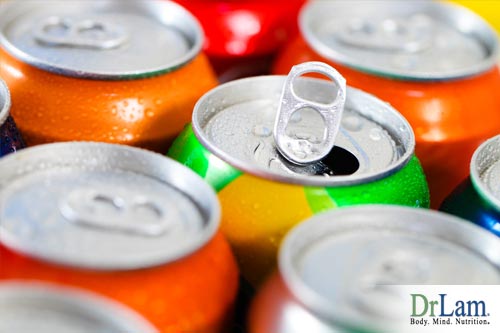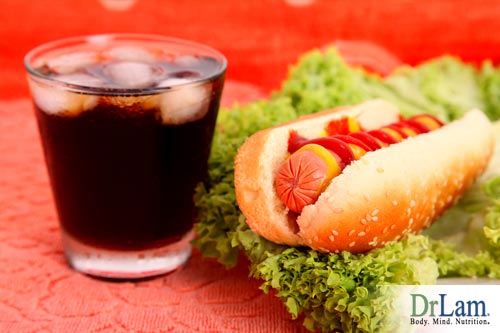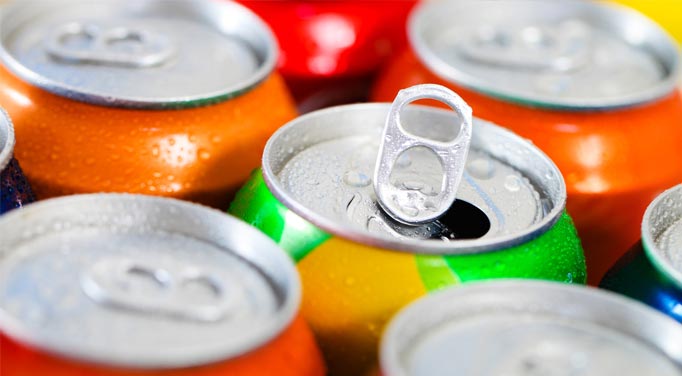
 No one would argue that soda is healthy, but the sweet taste, effervescence, and caffeine boost can seem like just the thing to get you through your day. The more soda you drink, the more toxic it becomes, regardless of whether you drink regular or diet. Whether your drinking several sodas a day, or just a couple a week, cutting it out can help you lose weight and improve your overall health. Individuals on the Chronic Fatigue Diet should limit or completely cut soda from their diet.
No one would argue that soda is healthy, but the sweet taste, effervescence, and caffeine boost can seem like just the thing to get you through your day. The more soda you drink, the more toxic it becomes, regardless of whether you drink regular or diet. Whether your drinking several sodas a day, or just a couple a week, cutting it out can help you lose weight and improve your overall health. Individuals on the Chronic Fatigue Diet should limit or completely cut soda from their diet.
The biggest impact of soda on your health is the excess calories that come from sugar and offer no nutritional benefit, and may contribute to tooth decay, diabetes, and even thinning bones. Diet sodas may have fewer or no calories, but they are not any healthier for you than regular soda. In fact, they have been linked to increased risk of heart disease and depression, fatigue, and pain syndromes, like Chronic Fatigue. Therefore, these drinks should be eliminated from individuals on the Chronic Fatigue diet. It is unclear whether phosphorus in soda is harmful to your health, or whether it is the simple fact that drinking soda replaces more nutritional beverages such as milk that can help strengthen bones.
If you want to reduce the amount of soda you drink the following strategies may help:
Soda, especially caffeinated soda, can be physically addictive and trying to quit cold turkey can lead to withdrawal symptoms, most notably headache and irritability. Try replacing one soda each day with water or tea for a few days, then replace another soda for a few days, and so on, until you are down to one a day. Then try cutting back to three or four times a week.
If you prefer the cold turkey approach, try thinking of it as a two-week or 30-day experiment and see how you feel. You may need an occasional cup of coffee or tea to help you kick the caffeine part of the addiction, though, so be prepared.
 If you start keeping track of your calories, you may find yourself more aware of just how much soda you’re drinking, which may just be enough to make you swap that fourth soda of the day for a glass of water.
If you start keeping track of your calories, you may find yourself more aware of just how much soda you’re drinking, which may just be enough to make you swap that fourth soda of the day for a glass of water.
Instead of, or in addition to, counting the calories for that soda, think about how much time on the treadmill it would take to burn off the calories. A study conducted by Johns Hopkins University in 2014 involved placing posters in convenience stores information consumers that they would have to walk 5 miles or jog for nearly an hour to burn off a 20 oz bottle of soda. Teen customers who saw these signs were more likely than those who didn’t to opt for a smaller size or a different beverage, or even to forego the soda entirely.
If you can’t see yourself giving up your daily caffeine boost entirely, try drinking unsweetened tea. Iced tea can be just as refreshing as soda, but offers a number of health benefits, courtesy of the phytochemicals it contains. Unsweetened is better, but if it just doesn’t appeal, try adding a bit of lemon, mint, stevia, or honey to help ease the transition.
Whenever you feel like you want a soda, start with a tall glass of ice water first. If you still want that soda, go ahead, but you will probably feel more satisfied than you would have expected. If you don’t care for water, try adding some cucumber or orange slices, melon chunks, berries, or mint leaves. Experiment to find what tastes good to you.
The number one killer of any diet, no matter how good and balanced the diet may be, is sugar. A weak body needs to be replenished nutritionally. Sugar robs the body of this precious recovery channel. If you have a family history of diabetes, you further the risk of sugar worsening your pre-existing illness. Whether it is chronic fatigue diet, adrenal fatigue diet, paleo diet, Gerson diet, the common thread is avoidance of sugar. Chronic Fatigue Syndrome is a condition with multiple causes, from infection to stress. Sugar exacerbates both and retards the healing process. Excessive sugar intake makes recovery from chronic disease almost impossible. Sugar is a drug. Make no mistake about it. Accept that it is a socially acceptable addiction that can ruin your health and you will have a proper perspective of this compound. The link between sugar and cancer is also clear. Cancer cells feed on sugar.

